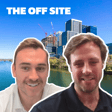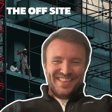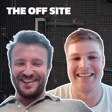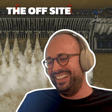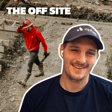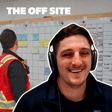Become a Creator today!Start creating today - Share your story with the world!
Start for free
00:00:00
00:00:01

Canada's Hydroelectric Ambitions: The Site C Project Examined
Join Jason and Carlos in this episode of The Offsite Podcast as they dive into:
⚡ Canada's Site C Dam: This massive hydroelectric project's engineering challenges and environmental trade-offs.
🛠️ Procore's Growth Strategy: Analysing the construction tech giant's new product announcements and what they signal for the industry.
🎸 Construction Sites as Cultural Spaces: When a French band films in the Toulouse Metro tunnel, is it an opportunity or a disruption?
Key Timestamps:
00:00 - Intro & Universal Studios UK
03:19 - Site C Dam discussion
09:57 - Procore's Groundbreak event
30:38 - Bouyge's underground concert
Check out the Off Site newsletter here
Follow Carlos on Linkedin | Follow Jason on Linkedin | Check out Aphex
Transcript
Environmental Impact of Large Dams
00:00:00
Speaker
it's always hard to easy to forget the scale of these things so i think it was the reservoir area was 93 square kilometers that's that's massive um yeah and obviously you need to be able to hold enough water to keep the thing running running um so the volume is always going to be big the trade-off is pretty massive from an environmental point of view so when these dams are created it's not just Like you stick a dam in a river or a source of water and it starts to generate electricity off of it.
00:00:28
Speaker
They flood serious areas of land in the process. And um yeah, there's this giant trade off between something that is highly efficient at producing electricity, but that's something that's arguably more damaging than other forms of electricity that will produce carbon, for example.
00:00:45
Speaker
So it's like, what about the, we remember we talked about that one in China late last year that flooded like three cities or something as part of the, three gorges maybe three gorges. Yeah. Were you about to say that? Did I, did I take your punchline? I'm sorry.
00:00:59
Speaker
No, no, no. But I did look into that one. That, that is a thousand square kilometers of reservoir. That is 10 times the size. So that yeah, that one's, ah that one's crazy. And yeah, I think it was three cities that were lost or something like
Introduction to Offsite Podcast and Hosts
00:01:12
Speaker
that.
00:01:12
Speaker
Yeah.
00:01:19
Speaker
Welcome to the Offsite Podcast, where we cover all things major construction and technology. I'm Jason Lansini, coming to you from ah Germany, Deutschland. With me again is my co-host and chief revenue officer at Apex Carlos Cavallo in London.
00:01:35
Speaker
Today, we are talking about Canada's massive Site C dam that is approaching completion.
Canada's Site C Dam Project
00:01:42
Speaker
We dive into a flurry of announcements from late last year at Procore's Groundbreak event and see where those are at.
00:01:49
Speaker
And finally, we are going to look at a band shooting a music video in a construction site. and work out is that cool or not. Carlos, how are you mate?
00:02:01
Speaker
Very well, thanks. How are you? Very good. Easter sorted for you mate, after the announcement yesterday, Universal Studios being built in the UK or something like that. Yeah, it's gonna open at perfect time that I'm thinking my son will actually be tall enough to go on the ride so I'm not just stuck in some sort kids. It is a mega project so he'll probably be another 10 years older than that.
00:02:21
Speaker
Yeah, yeah, yeah, but he won't have any hair by the time he goes there. but ah His children can go. ah Yeah. One for the great grandkids. And there was quite an ambitious timeline on it, though.
00:02:34
Speaker
it's It's like early 30s. I know that sounds crazy, but it's... Early 30s as in the year, early twenty thirty s not when your newly born child gets to their early Yeah.
00:02:46
Speaker
It's a scary thought. Yeah, no, I think it was less than 10 years and it's, it's, it'll be the biggest theme park in Europe or something like that. So yeah. Do you reckon, side note, do you reckon this like spurs a big ah ah reinvigoration in Rollercoaster Tycoon? Do people start like modeling out the theme park and on their over Easter?
00:03:07
Speaker
Universal Studios UK version. Nice. Yeah. Cool. The ideas we give away on this podcast. Unbelievable. You can make at least $4 with some of these ideas. Yeah. a Uh, cool. Sure. Well, diving in right off the top.
00:03:24
Speaker
Uh, major project for the week, Site C dam. So for some background, for those that don't know, Site C dam project, which was initiated in 2015 in British Columbia in Canada on the Peace River represents one of Canada's most significant infrastructure developments in recent years.
00:03:43
Speaker
As of Feb 25, there were three of the six generating units operational and that has the sufficient power to ah power approximately 80,000 homes.
00:03:55
Speaker
It's on track to be like fully complete and have all units in service by fall 25 and ultimately being able to produce enough power to power 500,000 homes.
00:04:07
Speaker
From a construction and infrastructure perspective, what makes the project noticeable, notable other than the size is this kind of like unique L-shaped design, ah which is, i guess, a non-conventional strategy, cotton.
00:04:21
Speaker
And it's partly because of the challenging geology of the site. Unlike many dam sites that are built on bedrock, Site C sits on unstable shale um that effectively is, to quote one of the engineering articles, deceptively hard when dry, but soft, swelling and cohesionless when exposed to water.
00:04:43
Speaker
So not not good if you're putting a dam on it, which famously has a lot of water. Wishing they went with wind turbines at that point. So other than relocate the whole dam, they've gone with a L shape and i think also a ah recompacted earth-filled design.
00:05:02
Speaker
Thoughts, so many things to dive into. This is a very cool project. i don't know if you looked at a bunch of the photos. It's always hard to, easy to forget the scale of these things. So I think it was the reservoir area was 93 square kilometers. that's That's massive.
00:05:16
Speaker
um yeah And obviously you need to be able to hold enough water to keep the thing running.
Electricity Generation vs Environmental Damage
00:05:20
Speaker
running um So the volume is always going to be big. I don't know how many football pitches there are in 93 square kilometers to go back to our usual one, but it's but it's a lot.
00:05:30
Speaker
Digging into it, because I've never really, i can't say I've ever spent too much time researching into dams and obviously the the efficiency of how much electricity they actually generate.
00:05:40
Speaker
The trade-off is pretty massive from an environmental point of view. So when these dams are created, it's not just... Like you stick a dam in a river or source of water and it starts to generate electricity off of it.
00:05:53
Speaker
They flood serious areas of land in the process. And um yeah, there's this giant trade off between something that is highly efficient at producing electricity, but that's something that's arguably more damaging than other forms of electricity that will produce carbon, for example.
00:06:10
Speaker
So it's like, what about the, we remember we talked about that one in China late last year that flooded like three cities or something as part of the, three gorges maybe three gorges. Yeah. Were you about to say that? Did I, did I take your punchline? I'm sorry.
00:06:23
Speaker
No, no, no. But I did look into that one. That, that is a thousand square kilometers of reservoirs. That is 10 times the size. So yeah, that one's a that one's crazy. And yeah, i think it was three cities that were lost or something like that.
00:06:36
Speaker
The dam, so I've just pulled up on the screen here and you can see, yeah, this is the L shape of the dam. And so you end up with this long earth-filled dam along one side here. And just for like some context of scale, that earth-filled dam section is 60 meters high and it's over a kilometer long.
Construction Aspects of Site C Dam
00:06:58
Speaker
And then i think the i think the other side is about 400 or 600 meters long as well. So it's a pretty big piece of kit.
00:07:08
Speaker
Yeah, they're they're they're massive and obviously I think it's risen from, I want to say six to something like $16 billion. dollars When you think the bulk of that is just concrete and this huge structure, obviously the turbines itself, if you compare it something like nuclear, it's relatively low tech. It's not like this super complicated build. So to spend that much money on majority concrete sort reinforces the scale of of what they're trying to achieve.
00:07:36
Speaker
Interestingly, the um I think I saw that the biggest like cost increase was the was in the reinforced concrete like buttress area, which is like double the budget or whatever. So yeah, I think what ah what I read was that the um because of the ground conditions and the expansive, terrible shale soil ground conditions,
00:08:00
Speaker
Yeah, it's much easier and more accommodating to the expansive soil than doing, say, a conventional a concrete dam. ah the Yeah, the project's, I think, basically all but finished. um And relative to the price of other dams, so there's a lot of like, ah there's a lot of hydroelectric dams being built around the world at the moment. We've covered them on previous conversations.
Procore's Groundbreak Event Recap
00:08:25
Speaker
We know in like, ah in countries like Australia, there's a ton of them being built.
00:08:29
Speaker
built or coming down the pipe in the scheme of things actually the price doesn't feel like it is given the extenuating circumstances of the site it doesn't feel like it's actually that bad a value because i know we looked at like the the barumba one in australia that's forecast to be 10 to 15 billion u.s aussie dollars you probably get a bit of a bonus in terms of the location right because It's going all sorts of factors that present whether you're going to have an efficient dam or not. But looking at the actual, the output, the cost, it is pretty good because you're spending something like a quarter or less of the price of nuclear for almost the same output.
00:09:08
Speaker
And these dams have a running life of about 80 to 100 years, which is longer than a nuclear power station. So... there's an argument to say they're much more efficient than nuclear yeah and you get you get the double benefit right you get water security plus the energy yeah and you get and you get storage yeah but it's that trade-off where 93 kilometers of land has been lost which was natural habitats farmland etc so yeah yep Obviously, Canada is a pretty big country, so but you wonder how much of that value prop was before they tripled the budget of the project because then it does lend itself to other options probably being more viable um yeah or efficient. and
00:09:45
Speaker
But yeah, congratulations to ah the the alliance, the joint venture that delivered it, which included Athena in North America. Yeah, really cool, really cool project.
00:09:56
Speaker
Cool, moving on. Procore's annual Groundbreak event was held late last year. We talked about it very briefly in November. It was held in Denver, Colorado. The scale of these events is not like your typical shitty construction event.
00:10:13
Speaker
There were 4,500 people. Tell us what you really think. ah have been day They suck. ah That's what I think. Lease this one here. It's like open. It is a we're selling you something.
00:10:25
Speaker
Whereas you get those ones where it's like come to talk about knowledge sharing and like every presentation is a event is like a paid vendor presentation. The titles of the event like are learnings from something or best practice for doing something. And you go, oh, this will be educational. And you go down. It's just like ah it's like two seconds of best practice. And the rest is just an ad for some ah spreadsheet with a really cool macro on it.
00:10:49
Speaker
Yeah, yeah. So yeah, no, most of them totally suck. At least this one is a good party and really open about the fact that it's just ah a ah single vendor ah hosting it event.
00:11:03
Speaker
um There are 4,500 people attending from more than 35 countries. Throughout the event, so think it ran for two days, throughout the event, they made several major product announcements, including integrated resource management,
00:11:18
Speaker
a ah protocol mapping solution, a new like enhanced set of safety tools and then AI capabilities because you know you have to have AI capabilities in 2025. A couple of them they had like built internally some of them are through acquisitions. Yeah there's a lot of things happening they built Intel they bought IntelliWave technology the mapping tool was through the the acquisition last year of Unearth, which is a ah mapping tool.
00:11:47
Speaker
I kind of want to go through one by one and see like, I think a number of these are starting to hit product at the moment, even in their like first iteration. um There is a tendency to slightly like announce ahead of the the thing being a reality.
Procore's Strategic Expansion
00:12:02
Speaker
But I'd like to like pull them apart one by one and and dive into it because so you know these these features or solutions that they've announced that are that they've that they're shipping are whole companies at the moment. So on the safety side, like what they the the workflows that they cover around like you know, job start cards, work method statements, observations, those sorts of things.
00:12:26
Speaker
Safety culture is a many hundreds of millions slash possibly billion dollar company at the moment, which does just that. ah And then on the resource management side, there are a ton of resource management ah tools out there, Bridget and others.
00:12:42
Speaker
So that's whole companies. um mapping side feels like it's overlapping a lot with what people would be paying right now for maybe like ah an Ezri Arc JS.
00:12:53
Speaker
So that's a lot of plates to spin. Yeah, what do you think is driving that? And we can break it down one by one. We can start like an overall strategy. But yeah, what's your thinking?
00:13:03
Speaker
Procore's growth and share prices, it's flat, right? Or particularly share price. It's been at a level playing field. So they must be thinking, right, to really grow at a rate, we need to expand from classic project management stuff to being the full suite that all these big vendors want to be.
00:13:20
Speaker
Yeah, so for some, just to give some context to that, for those that are not sitting there watching the stock price all of the time, Protocol's revenue 2023 and grew from million to billion which ou will cut out how long it takes me to do this math 20 to 25%.
00:13:46
Speaker
hi percent You're the math guy. So 20% roughly annually, um which is a decrease on the prior year and definitely a decrease on the prior year before that. So yeah.
00:13:59
Speaker
A curve you'd expect when a company gets to that size for sure. Yeah. Internally, you'd bet that their strategy is we need to broaden our user base or broaden our revenue model to get more cash from projects.
00:14:12
Speaker
yep But then if we think, I know if we start with mapping, for example, is this Procore starting to think they need to be an infrastructure or major projects, which we don't see them in very often? Are they trying to sort of pull in not just personas or users on a project, but actual new category of projects that they've always been in that sort of small to medium building company focused in the US and Australia type market.
00:14:37
Speaker
yeah um Are they going for major schemes um because a mapping tool you suggest isn't for a building project? It could be though, if you're ah if it's a mapping tool, when you think you're a single, you know you maybe you're a midsize or a small contractor that's got projects across a city or a country.
00:14:53
Speaker
Or like a housing developer with these huge new towns that are being built. It's probably a looser investment if you're not also going for the big heavy stuff. Yeah. Well, think where if you think about where the money is spent, so I think, yeah, you're definitely right. They'll be like, what's the strategy for growth?
00:15:07
Speaker
We've seen them make big investments we talked about before, like in other international markets to varying degrees of success. But they'd probably be looking also, and we've seen them make hires in the major civil and infrastructure space.
00:15:21
Speaker
In that space there, um there is a big spend on tools like Esri, ArcGIS. Yeah, they're not cheap, are they? Yeah, it's not cheap. It's big spend. And most people are using only a fraction of what that actual platform is designed to do and needs to do. So I think the use case for our industry is a lot smaller than what Esri is capable of doing.
00:15:46
Speaker
So it's not like they need to replicate all of Esri. Correct. But there's also some of the big... suites we know are a bit naive to the full appreciation of like a small area that they're looking at.
00:15:59
Speaker
Yeah. And these tools have so much capability because every project is different. Everyone demands something different for their scheme. So there's always that danger that you're going to spread yourself into all of these modules or sections.
00:16:13
Speaker
not go deep enough in each one so they don't really take off and then you're still trying to flog this huge suite of sort of underperforming or um this sort of fractional use that doesn't make sense in the long run yeah so if they are really going to grow into all of these areas in a serious way you'd expect the pro core team to grow massively so they can really like go for it within each part rather than just sort of acquire bolt it on and hope that that tackles everyone in the mapping space or the resourcing space or yeah i i think you can make that argument for like someone that's like maybe got one or two or three products and they're trying to go to a lot but product project protocol has six and a half million products and so these are they you right they no they've done
00:16:59
Speaker
They've already, like I think think, crossed that hurdle of going like truly, truly, truly multi-product. And I think they have teams. you know We've seen from there, I think we talked about previously, or at least we covered internally, the they've they've talked openly in their annual reports about being able to take a single contractor from $300K a year to $3 million a year in spend. through products and expansion.
00:17:22
Speaker
I think this would be, they'd be looking at, you know, we have this big install base of customers. What's the next thing that we can keep selling those customers? Cause it's way easier to drive growth through selling the next thing to that set of customers.
00:17:37
Speaker
There's less of a like reliance on, can we break international markets if we can, if we can sell a mapping tool to existing customers. It's way closer you're to an upsell than a, It is. it's I think a but it'd be wholly that. don't think they're trying to use these things to the, I think it's a bigger risk.
00:17:54
Speaker
I think it's less likely they're using these things to solely acquire new customers. It's mostly about driving growth in existing. And they're definitely going to start with less, I would imagine, less features than they might need, as you described, they're going to under cook it and then they'll find out we're missing these next few things and they'll build those. Yeah.
00:18:12
Speaker
But the interesting thing would keep track on like their appetite for building out each of those, because you could go on a, you could have huge teams for a long period of time, really going through that process of iteration and feedback for market and building out the feature set. So it'll be really interesting to see how shallow or deep they're going to go with each of these.
00:18:32
Speaker
are they trying to get that sort of one size fits all, yeah, sort of approach? um So I think the mapping thing we've talked about that I think that makes sense in terms of like, there's probably an initial initial ah bucket of spend.
Impact of Procore's Resource Management Product
00:18:46
Speaker
um Construction is a ah thing that happens in the real world. So having things connected to mapping makes a ton of sense. Like ah from the people we've talked to in Procore, it's like they've, why have we not, this obviously could have had and should have had this earlier.
00:19:00
Speaker
What are your thoughts on, well, pick your poison, resource management or um or safety? I think um resource management is an interesting one. It's obviously a competitive space at the moment.
00:19:12
Speaker
And I don't think anyone's completely nailed it at scale. So there's a lot of tools and in different markets. There's some like familiar faces that we see, particularly in the UK and ours, but no one sort of smashed it.
00:19:24
Speaker
Do you think maybe that's obviously it's really getting to site so they're growing that existing user base of people who use Procore on a daily basis but like also trying to capture data and own the data and use that in a more meaningful way?
00:19:38
Speaker
I think this is a ah really obvious ah one to like build into. So yeah, we talked before about how there is this gap for most projects and contracts, especially in the larger project space where on the capturing of resource actuals,
00:19:56
Speaker
You know, there's there's ah there's a site diary, there's ah there's ah a swipe card system, there's some other payroll system, and they're all like totally different records. One of Procore's like biggest product sets is their financial product to run like cost and and invoicing and and all and like link to their pay product.
00:20:15
Speaker
And so I think there's a lot of benefits here and things that are mutually beneficial, which is like, There's any company can build reporting on top of data. So getting to the report is the easy bit. It's like getting the data and the capture of data. ah The actual data, so actual labor-part people, yeah the unlock you have from that data set is massive.
00:20:38
Speaker
Obviously, they're investing in AI too, but that should make that process easier than it used to be to use that data in a meaningful way. I think it not only then means that they've got a meaningful solution that is integrated really, it can get really integrated tightly with the financial product, which are like, that goes really nicely together.
00:20:56
Speaker
I think it drives more people into the pay space where they're trying to be the payment solution here um because you can suddenly access you immediately just like can drive there's a lot of things you can imagine cross selling into the supply chain that are the ones doing the the providing the resources it's a it's a big product on its own Yeah, yeah, it's massive.
00:21:20
Speaker
but But the reward is huge. Like if they can really nail that, everything else gets stronger. Yeah, um yeah so yeah it reinforces the whole model. It does make you a little bit scared if you're a customer. Like you're you're equally saying as a customer, especially ah you know a large construction contractor, you're like,
00:21:40
Speaker
Yeah, actually solving that would be really valuable. But at the same time, you're like kind of bragging in your annual reports of like, we 10x the spend of this single customer. yeah And if we add this more, we can get them to spend 20 times as much. Also, you can never leave.
00:21:56
Speaker
If you actually use everything. You're fucked. Yeah, you're so... like Okay, so should we leave? but we need to procure 50 systems. Yeah. ah Like, yeah. ah You'd start to see like, you'd start to see like, you remember back in the day when you'd buy a vi a a desktop PC and it'd be like Intel inside?
00:22:14
Speaker
yeah like And you knew that like whatever company's computer you were buying was just like a very thin wrapper around like an Intel. You'd be like tier one contractor.
00:22:25
Speaker
Buy Procore. And then also, if you get came really to the extreme, if you don't like Procore, you're not going to join the company that use it because you're going to be using all of their systems every day. So yeah they need to really nail it Otherwise, they're locking in these companies and putting them in a pretty difficult position.
00:22:41
Speaker
But yeah, it is a valuable problem to solve. So I can see there is a reasonable value exchange there. But yeah, you you you will be stuck forever in there. Was it you before that was telling yesterday about not Procore, but another large construction technology vendor that would basically...
00:23:06
Speaker
they were in a tier one contractor was stuck in a similar spot with a vendor that they was like kind of locked into and that the vendor would just email them annually some number between like 10 and 35 percent which was their annual increase and it was like when are you signing the renewal and then there was even like uh can we talk about this no let me know what day you're gonna sign and yeah I'd love to be a salesman at that company.
00:23:30
Speaker
ah like it's It's like how um it gives the whole space a bad name when when ah you know that company there, I think, is bought by private equity.
00:23:43
Speaker
So the whole focus on delivering value is kind of like flipped on its head. yeah It's about extracting value. yeah They're probably investing nothing into the product. and they're just extracting maximal price that they can get from a customer, giving them no support.
00:23:59
Speaker
That is the state of play that drives people to be nervous about, you know, what we talked about with, say, Procore's resource management. I think if there was if there could be one or two big players that are a counterweight to that, whether it's a Procore or someone else,
00:24:14
Speaker
that really keep up reasonable price and focus on end customer value. yeah It's the counterweight to keep everything else honest. I had another interesting conversation with a contractor, again, with one of the big suites and the contractor's stance is we want everything included, no exceptions, to ah just avoid them coming back every time there's a new product.
00:24:40
Speaker
and they've got to re-app or spend a huge amount of money on something that they don't even know if people would use, it's it way more easier to say everything's included. So projects can choose to use one of the the the fringe apps in the suite rather than the vendor trying to monetize all these fringe apps in the suite.
00:24:58
Speaker
So, yeah, it's a tough game for purchasing. Yeah, even worse. So it's like, it's kind of okay when they like brand them as very clear, different products. and it's like, you bought this, you bought this, but I've also seen where it's like, you put these random limits kind of embedded inside of the thing. So it's like, yeah, you can do so many invoices. This is not specifically one, but like you can do so many invoices, but until you do more invoices, you need to upgrade to like invoices enterprise or whatever the thing is. Once you're using your invoices, you can't be like, oh no, we'll invoice last.
00:25:31
Speaker
Yeah. It's it's annoying. All right, we're going to run out time, but let's talk safety briefly and we'll we'll leave the AI out of the episode ah for a change. So safety is another area. It's like not a small product.
00:25:44
Speaker
It's whole of companies. ah There's a lot kind of in it. There's like yeah safety ah documentation, method statements, job cards. I think also they're covering certifications. And so you end up with the kind of like certification book.
00:25:58
Speaker
I think they're also tying like integrations into wearables, toolbox talks. This is a big product. um Is it now just like we need to get growth. So we need to capture every single workflow that could ever exist.
00:26:13
Speaker
Yeah. I think there's part of it is does this reinforce um sort of the actuals and resource part of things? um because ah because also they've got the schedule module that they're kind of trying to push.
00:26:30
Speaker
So that yeah kind of sits well with those two that makes sense to think that if we can get site team safety teams ah more reliant on schedule data and the underlying data behind that, it might reinforce the use of the scheduling tool because there's another, like there's a side value prop with another team that might pitch reduce.
00:26:48
Speaker
But um it does feel like a the kind of outlier in a messy space that is not a small thing to get into. it's It's massive. So just to give some comparison here. So Procall is valued at about 10 billion US, I think, roughly, give or take from memory.
00:27:05
Speaker
um ah There's an Australian company called Safety Culture whose whole product is is actually even just a subset of what Procore's safety tools ah do or plan to do.
00:27:20
Speaker
And Safety Culture is valued at two and a half billion Aussie dollars. So that's about like a one and a half or something US. s So that's like 15% of value.
00:27:32
Speaker
And I guess once you're at that size, you need to you need to tackle sizable things because otherwise you're not going to get the growth from it. But yeah, it's not it's a non it's not a trivial amount of product yeah and sales motion and stuff too.
00:27:45
Speaker
But it's it it's like back to that whole like, yeah, you'll get so locked into this thing. There's a few examples of Procore just sort of investing in the space that is the hype at the time. um Right.
00:27:57
Speaker
So obviously the actuals, the resource part and mapping, huge amount of money being spent there at the moment. you go to DCW, I think a third of the whole conference now is just yeah GIS and mapping related.
00:28:09
Speaker
um And then a lot of contractors are really trying to work out this actuals on site because it unlocks everything from a productivity and performance point of view. And there was one or two examples of previous acquisitions during a hypes um to do with like property management things like that, which which failed. So maybe they're just sort of saying saying, OK, right. Safety iss the next big thing that VCs are spending money in and it's the next big grow.
00:28:33
Speaker
So let's just jump into that space and try to make it work. Yeah, I think Procore has the benefit of being of being able to be really specific as a vertical software company.
00:28:45
Speaker
um ah which you know means that they can like own a space. um The downside is that once you get to a certain size, your options for generating the next leg of growth are reduced. If you're a horizontal SaaS company that sells to all industries,
00:29:07
Speaker
ah in like marketing or sales or whatever, you can go and target the next incremental vertical to get to try and like win that next vertical or the next next category. But ProCause really has to now kind of just continue to eat every part of what a construction company or a construction client or construction subcontractor needs to deliver the project, which is probably to some degree, you can make an argument that that is good ah for the industry for sure. Cause yeah, there it's a world of disparate tools, but yeah, you end up on the flip side of a bunch of people getting locked in. And if the mentality becomes value extraction,
00:29:51
Speaker
Once you run out of things to build, you then are left in the like the big red one that no one likes that keeps raising prices hundreds of percent. You end up in that spot where it's like, well, we actually don't don't need to build an and build anymore. We can just we can generate 20% annual growth by raising prices 25% and having 5% churn.
00:30:10
Speaker
and having five percent chur Yeah. And then also tying it with our previous conversation around competition, your you you really can't do much in terms of the next best thing that comes to the market because you're you're locked in.
00:30:23
Speaker
Your ability to to use the latest tools and differentiate yourself from others becomes pretty
Brut's Music Video in Toulouse Metro
00:30:29
Speaker
slim. I feel like we did a good job at not making it too much of a salesperson for startups.
00:30:36
Speaker
Yeah. Okay. um Cool. ah Final topic in the in the last minutes of the of our conversation. So for background, this was, yeah, so ah music videos in construction sites. Cool.
00:30:51
Speaker
um So recently, Boig, the large French contractor, shared a video of a French band, which you can print pronounce or or I can try.
00:31:02
Speaker
Brut. I'm pretty sure that's right. Cool. Recording a live session of their song, The Intoxication of Power, ah inside a tunnel about 30 meters underground ah on the new Toulouse Metro project. So an under construction Metro project.
00:31:20
Speaker
So it was a live session ah brought together all these different musicians. It was kind of like a theme for the for the video. Yeah. Yeah, a combination of like something that might be like, don't I guess this is but popular culture tying together visibility of a construction project. Is it, was it, I'd imagine it was a bit of a disruption for the project at the time.
00:31:41
Speaker
You know, I'd imagine getting people in there and the safety considerations, et cetera, et cetera, was somewhat of a disruption. ah do we think it do you think it is a good disruption that ah you know is some there's some benefit to the industry for it or do you think it was just a kind of thing that you would be on the project going, God, why the hell did we agree to do this?
00:32:06
Speaker
I'm going to make the assumption that it's not cause delay to a scheme to run this stunt. um And on that basis, I'd say it's cool. I think it's for the contractor engaging with a young audience who would never have heard of Weeks.
00:32:20
Speaker
like I think, why not? um It looks cool. i don't know about the acoustics of a tunnel, but you'd imagine it it was an interesting thing for the band to do. it's hard to pull away negativity from it for me.
00:32:34
Speaker
So, yeah, I'm all for it. It did make me laugh to think maybe... and contracts are running out of money or over budget they should do little fundraisers and bring bands to site and sell tickets i guess obviously is awesome yeah like a live aid for construction teams who need the cash but um no i'm all for i think it's cool i think why not there's obviously we have to make the assumption that they've planned it to be safe and it's not causing delay to a project and it was a timely exercise. But yeah, why not?
00:33:04
Speaker
What do you think? does it Do you think the contractor gets to organize ah or the client? Well, either could raise the idea, but you'd assume that Boyce is the principal contractor, so they must be heavily in the mix because you're not going to, like the client could take ownership of site, I guess, temporarily, depending on the face of the job.
00:33:20
Speaker
um I'd imagine the client in this, because this is the new metro in Toulouse, right? So it's probably a bit of a promo for that tunnel that's going to be opening.
00:33:30
Speaker
I'd assume that way. Yeah, because there's like this weird side to it where like I think like a lot of people would say this is good. It gives visibility to like infrastructure that is underground that people can't see that's being built for the city or the country.
00:33:45
Speaker
But there's like this weird side of it on the construction contractor side where like some of these things have to get written into contracts. Like as part of winning this, you will host. an open day or a fun run or a whatever.
00:33:59
Speaker
And by the way, you'll you'll kind of arrange it so people like pricing the hosting of the thing. Yeah. is this cut yeah There's this kind of like transactional side to it that feels...
00:34:12
Speaker
I guess, totally different to the, you know, the, ah you know, the output. Yeah. You'd like to think that's not the case. Oh, it's a hundred percent the case. Like if you remember when the, um, when we were working on. No, I mean the contractor actually like pricing it up into their bid. Like it would make more sense for the client to take possession of an area and plan themselves.
00:34:33
Speaker
my My guess is that there's some of these that are written into the contract yeah by the client. Like, let's say you win a major Metro and they're going to have, you know, sometimes they do the run through the tunnel, for example.
00:34:43
Speaker
Yeah, yeah. I reckon some of those are in the contract. And like, if we take like when ah the Queen visited Crossrail to do the official unveiling of it being called Elizabeth Line. Yeah, I saw what we priced like we had to shut the site for a day. We had to do all this prep work for that to happen. And and yeah and it was not a cheap.
00:35:03
Speaker
it was so It was pretty expensive. There's always a pot for like community engagement and events. So it's kind of like an elaborate one of those. Yeah. um So I don't it's unusual to have money in the pot for it.
00:35:15
Speaker
But yeah, I mean, the cost, even with this one, it's not like there was an audience. So like how costly could it have been in reality, especially we're doing it at night. And I know every every event has this, right? Like vendors are supplying stuff to every event, but it just kind of feels weird that I could imagine a planner sitting there doing a disruption claim for...
00:35:38
Speaker
for doing this event, right? Like that just feels, that just feels kind of funny. Yeah. yeah yeah and then And then there's a back and forth of like, they submit the claim for it. And they're like, well, you you could have, you could have out held it in a different part of the tunnel or something, you know, like you could have mitigated this delay by having quieter music or something Yeah, maybe they threw their commercial mind out the window for this one and everyone got together to plan a fun party. Yeah, quality surveys would definitely do that. No questions asked.
00:36:12
Speaker
ah Yeah, the commercial manager is a big fan of Brute. say I reckon if you dug into it, bold claim as we're about to wrap up, I reckon if you looked at the cost of something like that or like the Queen visiting Crossrail, it would be up there on on the cost of hosting something like the Brisbane Olympics.
00:36:32
Speaker
Yeah. The cost of Glastonbury. Have you been to Glastonbury? No, like but like, okay, maybe that's like over the top, but I'm talking like hundreds of millions or a hundred. Like it's a lot. I reckon that some of, maybe not hundreds of millions for that one in particular, but. I reckon that cost 200 grand. one? Yeah.
00:36:48
Speaker
that one yeah Yeah, I don't know. I'm skeptical. I know. I'm just comparing it to the one with the Queen. Yeah, the night the Queen comes in. That was massive. Yeah.
00:37:00
Speaker
Right. Thank you very much, everyone, for tuning into today's show. If you did enjoy today's episode, please do think about liking this video or following us on your chosen podcast platform. We really appreciate your support and we'll catch you all next time week. Bye bye.
00:37:14
Speaker
bye.


